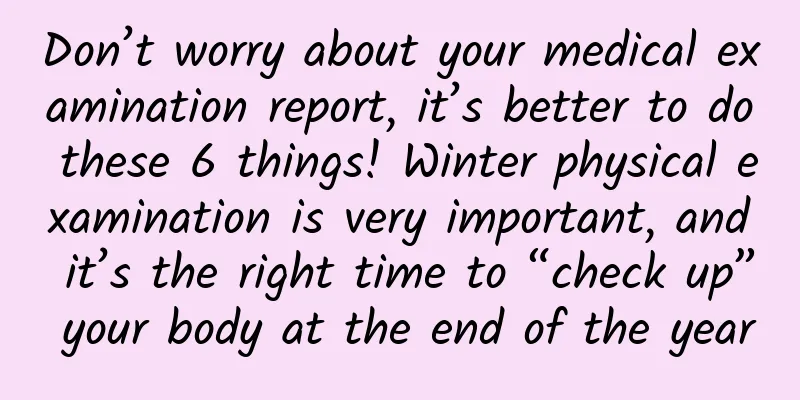How to distinguish between pregnancy and menstruation

|
Speaking of pregnancy and menstruation, they actually have many similar symptoms, which experienced women should know. A few days before menstruation and when pregnancy comes, there will be lower abdominal discomfort or increased vaginal discharge, which can easily confuse people. Especially for female friends who are not prepared for menstruation, it is important to distinguish between pregnancy and menstruation at the first time. Only in this way can we avoid the impact of bad living habits on the fetus. How to distinguish between menstruation and pregnancy The symptoms of menstruation vary from person to person and may include headache, breast tenderness, fatigue, tension, general malaise, mental depression or irritability, restlessness, insomnia, a feeling of heaviness in the pelvis, abdominal pain, diarrhea, dull low back pain, nasal congestion, edema, etc. The symptoms will disappear naturally after your period. Generally speaking, in the early stages of pregnancy, around 40 days of pregnancy, early pregnancy reactions may occur, such as nausea and vomiting in the morning, loss of appetite, fatigue, frequent urination and other clinical manifestations. Early pregnancy reactions vary from person to person. Some reactions are mild, while others are severe. Generally, the symptoms will be alleviated or disappear after three months of pregnancy. The relationship between menstruation and pregnancy Menstruation is the bleeding caused by the damaged surface of the shed endometrium. The normal menstrual volume is between 30 and 100 ml, with an average of about 70 ml. The amount of menstrual flow can actually reflect the thickness of a person's endometrium. The thickness of the endometrium is a necessary condition for the fertilized egg to implant. Generally, female pregnancy requires the thickness of the endometrium to be at least 8mm. Because the embryo needs to attach to the endometrium, the endometrium is rich in blood vessels and can provide nutrients to the embryo after implantation until the placenta is established. If the endometrium is too thin, less than 6mm, it is difficult to get pregnant because it is difficult for the embryo to attach and the endometrium to supply nutrients to the embryo to establish the placenta. If the endometrium is too thick, exceeding 19mm, it is often caused by excessive endometrial hyperplasia or adenomyosis caused by high estrogen or inflammatory stimulation, which is undoubtedly not conducive to pregnancy. Therefore, women who have been trying to get pregnant for a long time but still cannot get pregnant can observe their menstrual flow more often to see if it is because the endometrium is too thin, causing the fertilized egg to be unable to implant normally. At the same time, the menstrual period is the best time to eliminate inflammation in the body. If the inflammation in the body is severe, you can go to the hospital at this time to get some anti-inflammatory water. The above is an introduction on how to distinguish between menstruation and pregnancy. I hope it will be helpful to everyone. |
<<: Why can't I sleep during my period?
>>: Can I apply heat to my lower abdomen during menstruation?
Recommend
How to take care after a painless abortion
Nowadays, painless abortion is a popular surgery,...
What to do if amniotic fluid keeps leaking
Before giving birth, pregnant women may have the ...
Menstrual cramps and pain
When menstruating, people must pay attention to p...
Why is Laiyang pear delicious? What are the benefits and functions of Laiyang pear?
Laiyang pear is a special fruit with a particular...
Do I need to have a uterine curettage after the gestational sac is expelled?
After the gestational sac is expelled after medic...
Have you ever seen the real-life version of “dripping water wears away a stone”?
Many people know the idiom "dripping water w...
What causes uterine fibroids?
How are uterine fibroids caused? The exact cause ...
7 types of women are prone to cervical cancer
Cervical cancer is one of the important cancers t...
Medical abortion process diagram
When a pregnant mother has to end the life of her...
What is the reason for the reduction of leucorrhea after abortion?
Many women suffer from unexpected pregnancies in ...
What does menstruation without ovulation look like?
Eggs and sperm are prerequisites for pregnancy. I...
What are the different types of abortion procedures?
Science and technology are becoming more and more...
Take some melatonin when you can't sleep? 4 misunderstandings about insomnia medication, experts from West China University of Political Science and Law urge you to be cautious!
Facing the epidemic, Chengdu people are very stub...
Frequent and strong fetal movements at 30 weeks of pregnancy
The 30th week of pregnancy is already the seventh...
Hypertrophy of one side of the labia minora
The causes of female labia hypertrophy are very c...









